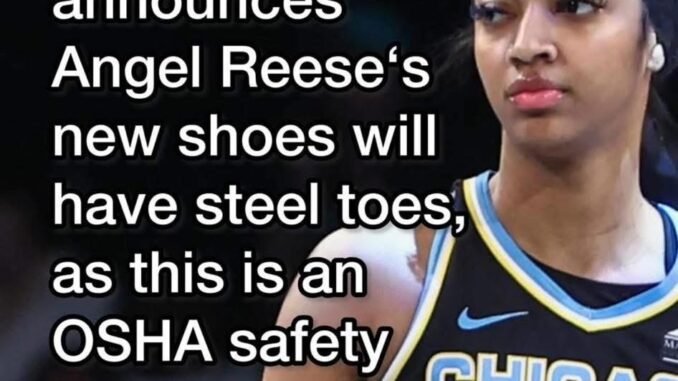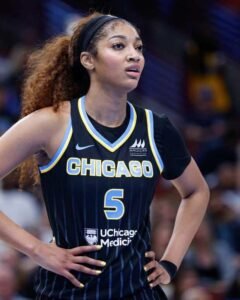
In a league where every misstep is magnified and every missed shot is met with disproportionate scrutiny, Angel Reese has found herself at the crosshairs of a new social media firestorm.
A viral meme featuring her in a Chicago Sky uniform, paired with the snide caption, “Reebok announces Angel Reese’s new shoes will have steel toes, as this is an OSHA safety requirement for all brick layers,” has lit up timelines with mockery disguised as humor.
The implication is obvious—Reese, like a construction worker laying bricks, is accused of consistently missing shots, or “bricking” in basketball slang.
But this meme is more than just a dig at an off-night shooting percentage. It’s a window into the wider world of online trolling, the uniquely hostile landscape female athletes—especially Black women—face in professional sports, and the uncomfortable double standards that persist in how we judge performance and personality in male-dominated arenas.
The Context: Reese’s Rookie Season Under a Microscope
Angel Reese entered the WNBA with massive expectations, a championship pedigree from LSU, and an even larger spotlight after being one of the most marketable college athletes in history. Her unapologetic attitude, charisma, and commercial savvy made her a lightning rod for attention. Drafted by the Chicago Sky, she joined a rebuilding team with a young core, tasked with the difficult job of helping to lead a franchise back to relevance in a fiercely competitive league.
Reese’s early performance has shown promise and flaws in equal measure. She’s averaging solid rebounding numbers and bringing hustle and energy, but her offensive game—particularly her shooting—has drawn criticism. Her field goal percentage has fluctuated and, like many rookies, she has experienced shooting slumps. But the vitriol that followed those struggles goes far beyond basketball critique.
Enter the meme: the steel-toed Reebok jab, invoking not only her brand partnership with Shaquille O’Neal-led Reebok but also her perceived poor shooting. The OSHA reference is an additional layer of sarcasm, painting her less as an athlete and more like a construction worker laying “bricks.” It’s a joke rooted in sports lingo, but one that carries the biting tone of a deeper cultural judgment.
A Different Standard for Angel Reese
Why has Angel Reese, out of all the struggling rookies or even veteran players having bad games, been singled out for this level of derision? The answer lies in the intersection of race, gender, confidence, and marketability.
When male athletes, especially those with brash personas, have rough patches, they are often defended with euphemisms: “He’s streaky,” “He’s just adjusting,” “He’s got the killer mentality.” When someone like Draymond Green or Russell Westbrook shows emotion or talks trash, it’s seen as passion or intensity. When Reese does it, it’s labeled “arrogant,” “unprofessional,” or “classless.”
 Reese has been under constant surveillance since her “You Can’t See Me” taunt during the 2023 NCAA championship. That moment, lauded by some as iconic and derided by others as unsportsmanlike, was a defining image of her college career. Ever since, her every move—on or off the court—has been dissected and weaponized. The steel toe meme is the latest installment in a series of criticisms that seem more personal than performance-based.
Reese has been under constant surveillance since her “You Can’t See Me” taunt during the 2023 NCAA championship. That moment, lauded by some as iconic and derided by others as unsportsmanlike, was a defining image of her college career. Ever since, her every move—on or off the court—has been dissected and weaponized. The steel toe meme is the latest installment in a series of criticisms that seem more personal than performance-based.
The Role of Branding: Reebok, Shaq, and Commercial Pressure
One of the most ironic parts of the meme is its invocation of Reebok—a brand that is staking part of its revival on Angel Reese’s star power. Backed by NBA Hall of Famer Shaquille O’Neal, who has championed Reese as the face of Reebok’s new basketball line, the partnership is more than a sponsorship; it’s a symbolic passing of the torch. Shaq has openly stated that he sees a younger version of himself in Reese: outspoken, unapologetic, and unbothered by critics.
But this high-profile branding also makes her a target. In a world where female athletes are still fighting for equal coverage and endorsement deals, Reese is already ahead of the curve. That success has a price. When she stumbles—whether in shooting, turnovers, or game decisions—the backlash isn’t just about her stats. It’s about knocking her off the pedestal of visibility that too many still believe she didn’t deserve in the first place.
The meme not only mocks her game but undercuts the legitimacy of her brand. It suggests she’s unworthy of the deal she’s received, that her commercial status isn’t backed by real basketball value. That’s a familiar refrain for women in sports, who are often told they’re only marketable because of how they look or act, not how they play.
Meme Culture and the Weaponization of Humor
This meme also sits in a broader cultural trend: the weaponization of humor to veil misogyny and racism. “It’s just a joke” is a familiar refrain when memes like this go viral, but humor is rarely apolitical. In this case, the joke reinforces a stereotype—that Angel Reese is all hype and no substance, a showboat without the skill to back it up.
But the numbers and impact tell a different story. Reese has helped bring attention to the WNBA in ways few rookies have. She’s part of a generational class alongside Caitlin Clark, Cameron Brink, and others that are driving ticket sales, TV ratings, and merchandise. The Chicago Sky, previously struggling to stay in the national conversation, are now among the most-watched teams, in part because of her magnetism.
Even her so-called “brick-laying” isn’t unique for a rookie. Many first-year players, especially post players adjusting to the WNBA’s physicality and speed, take time to develop consistent offensive rhythm. Yet few are meme-ified in such a derogatory way.
From Criticism to Resilience: Reese’s Role in Shaping a New Era
What the meme fails to capture is the resilience that Angel Reese embodies. She has never shied away from criticism. Instead, she’s leaned into it—whether it’s being called the “villain,” being doubted for her game, or being mocked for her confidence. She knows the rules are different for her, and she continues to compete anyway.
And as history has shown, some of the game’s greatest players were initially doubted or dismissed. From Shaq’s early criticism about his free throws to LeBron James’ rookie scrutiny to Serena Williams’ lifelong battle against biased narratives, the best often face the harshest critics. Reese’s journey is still unfolding, and memes won’t define her legacy—her response to them will.
Conclusion: Beyond the Meme, Toward a Better Conversation
The steel toe meme may have been designed for laughs, but its ripple effects speak to a broader cultural problem: how we treat women athletes, particularly those who challenge conventions. Angel Reese is not just a basketball player; she is a symbol of a new generation of athletes who bring their full selves to the game—flawed, fierce, and free.
As the WNBA grows in visibility and respect, we must evolve the way we talk about its stars. Critique is part of sports—but when it’s laced with sarcasm, sexism, and double standards, it ceases to be fair analysis and becomes cultural sabotage.
Angel Reese may be laying “bricks,” but she’s also laying the foundation for a future where players like her don’t have to apologize for their confidence, their style, or their journey. And no meme, no matter how viral, can change that.
Leave a Reply